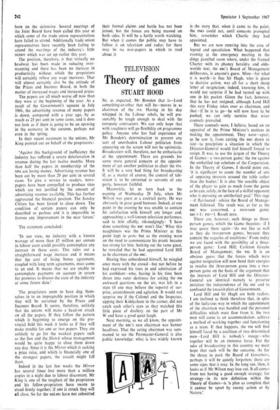Theory of games
TELEVISION STUART HOOD
So, as expected, Mr Bowden that is—Lord something-or-other that will be—moves in as chairman of the ITA. Having in his day whipped in the Labour rebels, he will pre- sumably be tough enough to deal with the company contractors. We can only hope that with toughness will go flexibility on programme policy. Anyone who has had experience of Mr Bowden's determination to prevent any sort of unorthodox Labour politician from appearing on the screen will not be optimistic. Broadcasters will, therefore, not be enthusiastic at the appointment. There are grounds for some more general concern at the appoint- ment of yet another politician to chair the ITA. It will be a very bad thing for broadcasting if, as a matter of course, the control of tele- vision is to be entrusted to servants of any party, however faithful.
Meanwhile, let us turn back to the evening of Wednesday 26 July, when Mr Wilson was guest at a cocktail party. He was obviously in great good humour. Indeed, at one point in the evening he was unable to contain his satisfaction with himself any longer and, approaching a well-known television performer, said to him affably, rib-nudgingly: 'I have done something the BBC won't like.' What this naughtiness was the Prime Minister at this point kept in petto but as the evening wore on the need to communicate his prank became too strong for him. Seeking out the same guest, he revealed that he had appointed Lord Hill to be chairman of the BBC.
Having thus unburdened himself, he mingled once more with the crowd—but not before he had expressed his trust in and admiration of his confidant—who, having in his time been thrust into outer darkness for asking the PM awkward questions on the air, was left in a state (if one may believe the reports) of sur- prise, astonishment and agitation. It would not surprise me if the Colonel and the Inspector, sipping their Kiddycham in the corner, did not catch each other's eyes as they watched this little piece of drollery on the part of Mr W and have a good quiet laugh.
Next morning, as we all know, the appoint- ment of the BBC'S new chairman was banner headlines. That the acting chairman was sum- moned to see the Postmaster-General is also public knowledge; what is less widely known is the story that, when it came to the point, the PMG could not, until someone prompted him, remember which Charlie they had appointed.
But we are now entering into the area of legend and speculation. What happened that evening at the emergency meeting in the dingy panelled room where, under the framed Charter with its phoney heraldry and olde- worlde text, the BBC'S Board of Management deliberates, is anyone's guess. Mine—for what it is worth—is that Sir Hugh, who is given to decisive action, was all for a short sharp letter of resignation; indeed, knowing him, it would not -surprise if he had turned up with one in his pocket. Given the fact, however, that he has not resigned, although Lord Hill this very Friday takes over as chairman, and that—if he is to go—he will now have to be pushed, we can only surmise that wiser counsels prevailed.
These counsels were, I believe, based on an appraisal of the Prime Minister's motives in making the appointment. They were—apart, as he saw it, from cutting the BBC down to size—to precipitate a situation in which the Director-General would feel himself forced to resign. It was, to use the jargon of the Theory of Games—a two-person game; the PM against the embattled top echelons of the Corporation. In the Theory of Games, I should point out, 'it is significant to count the number of sets of opposing interests around the table rather than the bodies.' It is also 'the sensible object of the player to gain as much from the game as he can, safely, in the face of a skilful opponent who is pursuing an antithetical goal.' This sage —if flat-footed—advice the Board of Manage- ment followed. The result was, as far as the BBC was concerned, a zero-sum game. Bac +1: PM-1. Result zero.
There are, however, such things as three- person games, which the Game theorists—if I may quote them again—`do not like as well as they do two-person games, because they contain the vagaries of coalitions.' From today we are faced with the possibility of a three- person game: Lord Hill; Carleton Greene Board of Management; the PM. It is an obvious guess that the forces which were against resignation will now bend their energies to resolve the three-person game into a two- person game on the basis of the argument that the interests of Lord Hill and the Director- General are identical—namely to preserve inviolate the independence of the BBC and to confound the knavish plots of Government.
Lord Hill and Sir Hugh are both realists. I am inclined to think therefore that, in spite of the ludicrous way in which the appointment of the chairman was handled and the personal difficulties which must flow from it, the two men will come to an accommodation, achieve a method of working together and functioning as a team. If that happens, the PM will find himself faced by a coalition of two determined men—Lord Hill is nobody's stooge—who together will be an immense force. For the sake of broadcasting in this country we must hope that such will be the outcome. As for the threat to pack the Board of Governors, perhaps it will be quietly forgotten; there are some signs that it may. In the long run, then, it looks as if Mr Wilson may lose out. It all comes from not having a good enough strategy; for strategy—in its new definition within the Theory of Games—is 'a plan so complete that it cannot be upset by enemy action or by Nature.'






























 Previous page
Previous page